Mood of the Boardroom: Christopher Luxon breathes new life into the party
National party leader Christopher Luxon, a former chief executive of Air NZ and of Unilever Canada, brings a business focus to politics. MPs are measured by KPIs and New Zealand business leaders say his focus on discipline is an important skill set for the current environment.
In the 2022 Mood of the Boardroom CEOs survey, respondents were asked to rate Luxon’s performance as Opposition leader, by holding the Government to account on critical national issues, on a scale where 1= not impressive and 5= very impressive.
He received a score of 3.24/5; 6 per cent of respondents gave Luxon a “very impressive” score. The majority (70 per cent) rated him at 3 or 4/5.
Luxon took over as leader of National after just a year in Parliament when Judith Collins was toppled amid poor polling and a chaotic move to demote political rival Simon Bridges. In last year’s survey, her rating was a mere 2.06/5.
Luxon’s rise coincides with a time when the gloss is coming off the Labour Government.
Recent opinion polls show National and Labour neck and neck. The latest Taxpayers’ Union-Curia poll, released last week, had National and Act able to form a government.
National was up 3 points on last month’s poll to 37 per cent and Act up 1 point to 12 per cent.
When becoming leader, Luxon promised a new era for the National party. “We are the reset,” he promised. “Much has been made of my relative newness to Parliament, but to be honest I see it as an advantage.
“I bring a fresh set of eyes, and what I see is that this place and this country needs a real shake-up.”
Many survey respondents agree Luxon has provided the reset the party desperately needed after being plagued by bad polling and internal ructions since the pandemic.
Already some 55 per cent of survey respondents believe he is starting to carve out a strong brand for National.
“He has ensured that voters see National as a credible option,” says RedShield CEO Fabian Partigliani.
“There seems to be unity in the party after a long period and his policies reflect a more mature business-like outlook which will be good to stimulate the economy,” says Cordis managing director Franz Mascarenhas.
Deloitte chair Thomas Pippos adds: “In a relatively short period of time he has sought to unify the caucus, build a following and positively differentiate themselves from the Government.
“The fact that he is not a career politician is a real positive.”
“Holding his party together for 10 months is impressive in itself,” says Precinct Property chair Craig Stobo.
“It could easily be forgotten where National was before he took the reins — it was an absolute shambles,” said a media boss.
But others noted while Luxon has made a substantial improvement, it is off a low base and is “best described as a work in progress”.
An independent director notes it will be important that the party moves forward in a progressive way to reflect the expectations of a majority of New Zealanders as the population demographics change.
“At times, the National party looks like it is seeking to appeal to the ageing conservative population and not Gen-Y and Z that are now exerting their dominance,” they say.
“Those generations are passionate about ending racism, purposeful living and solving climate challenges and the National party need to adjust itself to reflect a modern and progressive community.”
The head of a top investment firm advises: “He needs to shake the Christian-right reputation.”
“I desperately want to see some evidence that National is developing policies as well as slogans and soundbites,” a property boss says.
“Being the Opposition should be about holding to account and offering an alternative. It’s not just about opposing everything,” says another CEO.
Bagrie Economics’ Cameron Bagrie observes that National has improved off a low base at a time the Government has walked into some economic reality.
“Economically, New Zealand is devoid of real leadership across the entire political spectrum.
“It is a global problem where populism is driving policy. We do not have real bench strength across the entire political spectrum — we have some talent, but not the bench strength.”
CEOs are quick to point out that Luxon’s greenness in politics has sometimes held the party back from where they think it should be.
A CEO in the energy sector suggests he “hasn’t had any wins and is still an amateur politician”, while an environmental services CEO harks back to National’s heyday.
“He is not John Key.”
Plenty of room for new policies from National, say CEOs
When asked what policies National should consider in order to provide a clear choice at the next election, many CEOs suggest National sticks to the core issues that elections are often won or lost on — law and order, education, and health: “Sort out ram raids,” says one. “Get the health system caught up on postponed surgery due to Covid,” from another.
There was a strong call for more focus on education, with several noting it is “the key to prosperity”.
The New Zealand Initiative chair Roger Partridge, wants to see New Zealand “return our state schooling system to a standard where it is the envy of the world,”; and “Go hard on education — education today defines the economy in 20 years,” says Cameron Bagrie. “We are in serious trouble based on education achievement today.”
Economic management
While many CEOs want to see tax reform, tax cuts, and an end to the bright-line test, others would prefer to see the National focus more on social and environmental investment.
“Forget the tax cuts — give New Zealand an economic plan that has merit,” says Bagrie.
The head of a telecoms firm says the party should balance its reputation for prudent economic management with a clear plan for how Aotearoa’s growth and economic progress will be shared, “and how we will improve social and environmental outcomes for the next generation”.
A media boss suggests National closely re-examine the ideas former PM Jim Bolger floated about reimagining capitalism, and “Bill English’s social investment ideas should be pursued and embedded in policy.”
Reduce the regulatory burden
Business leaders say it is imperative the increasing regulatory burden is wound back, and the rhetoric that “government knows best” dropped. “We need a moratorium on excessive regulation,” says a banking executive.
Partridge advises National look to “cease costly and ineffective climate change regulations and subsidies operating outside the emissions trading scheme (ETS) and redirect revenues from ETS to lower-income households to assist them to meet the costs of climate policies.”
“Reduce the regulatory burden on business through a combination of RMA reform, liberalising overseas investment, and undoing labour market reforms — fair pay agreements and social unemployment insurance.” Dial-up immigration.
With myriad sectors and businesses facing unprecedented skills and worker shortages, they also want to see National “focus on immigration”.
One CEO wants to see National revise immigration settings in a way that is “directed squarely at pressure points in the economy — health, construction, services”.
Another calls for roadblocks to be freed up to “allow more labour to enter New Zealand in a frictionless way and the country to be more attractive”.

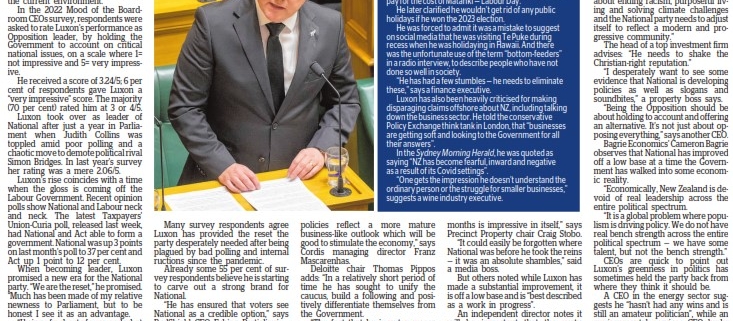
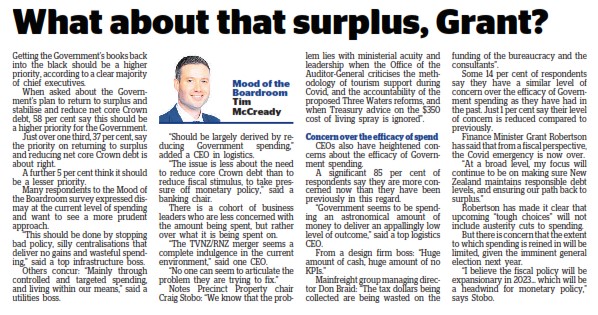
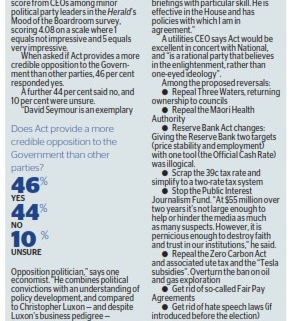
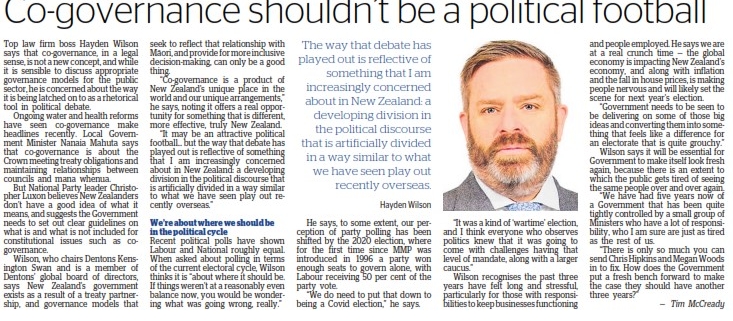
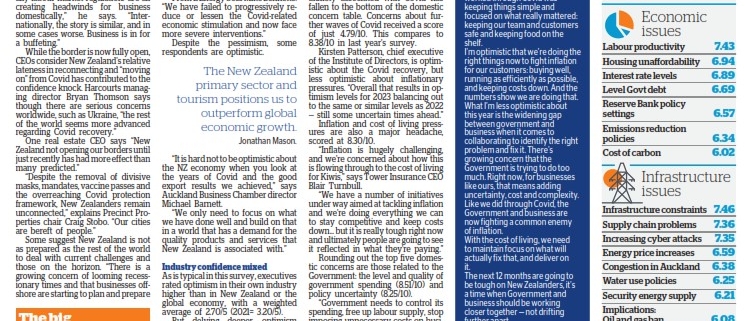
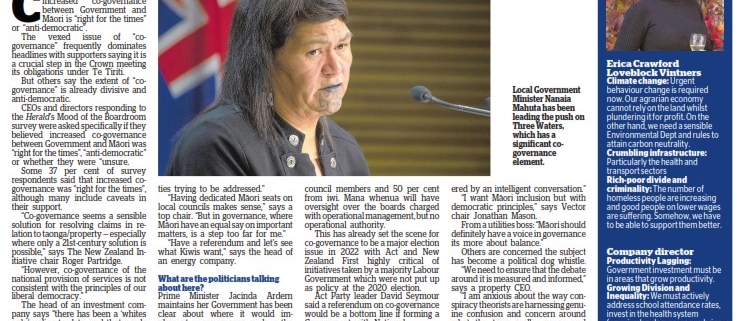
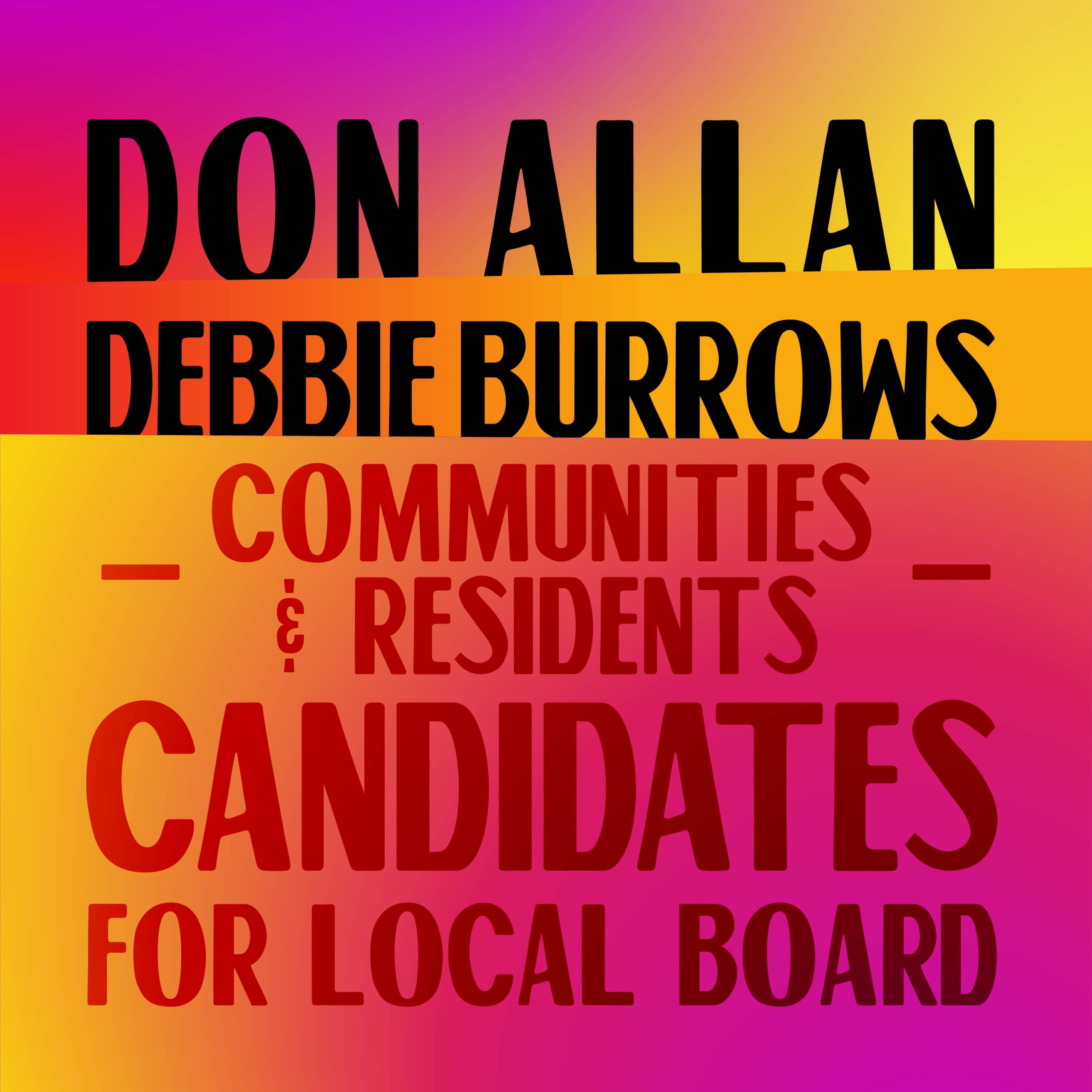
 In this local body election, what if we could do a little more than a tick and a prayer?
In this local body election, what if we could do a little more than a tick and a prayer?
